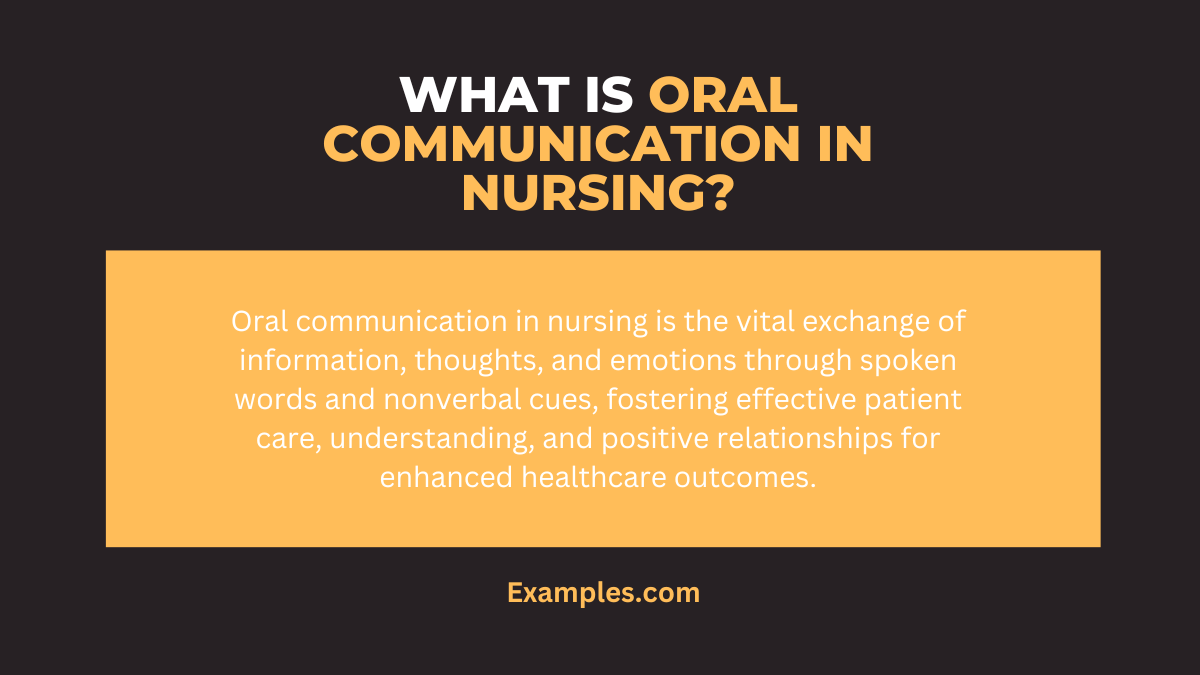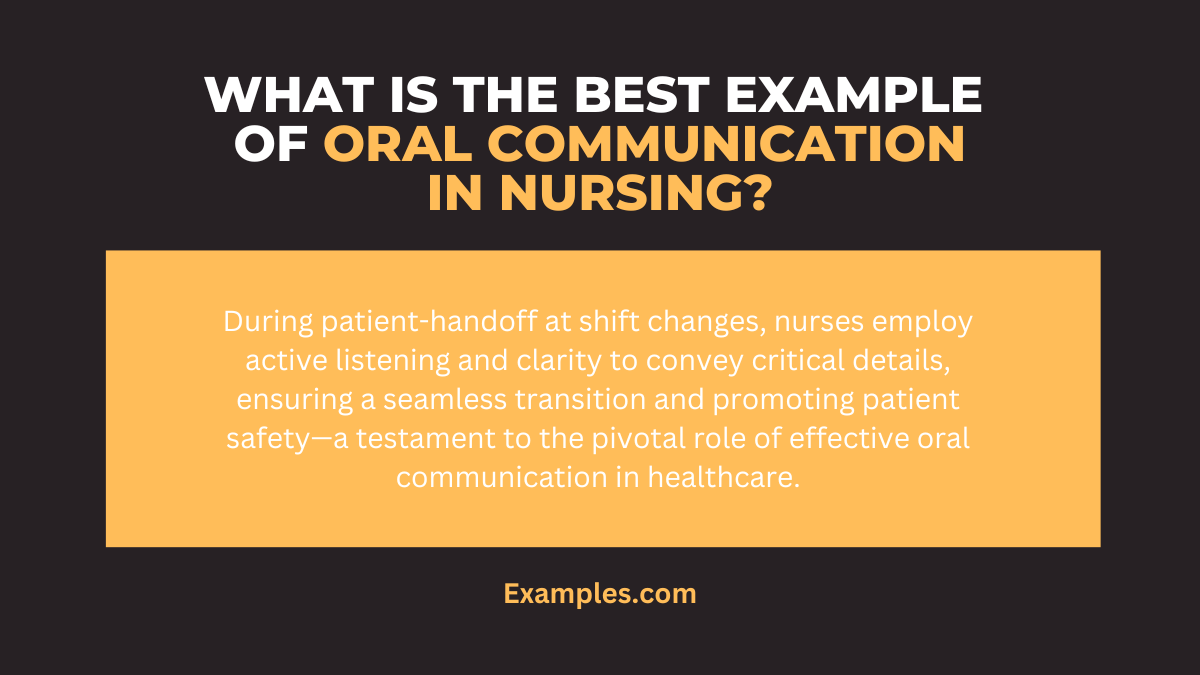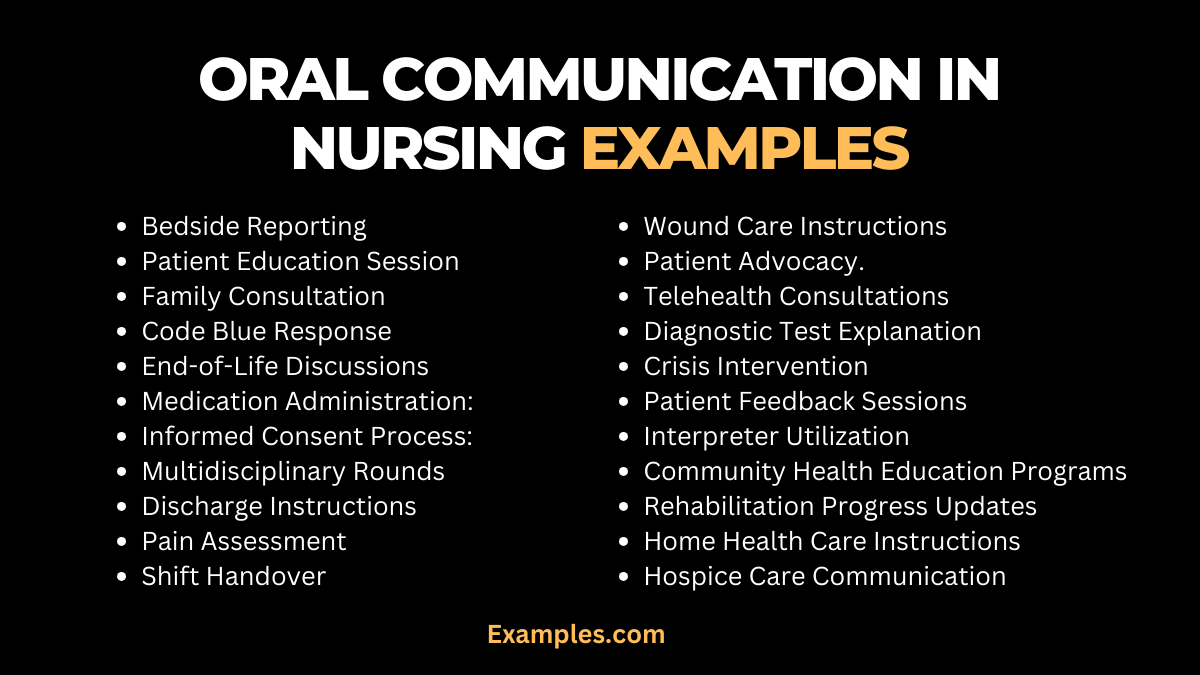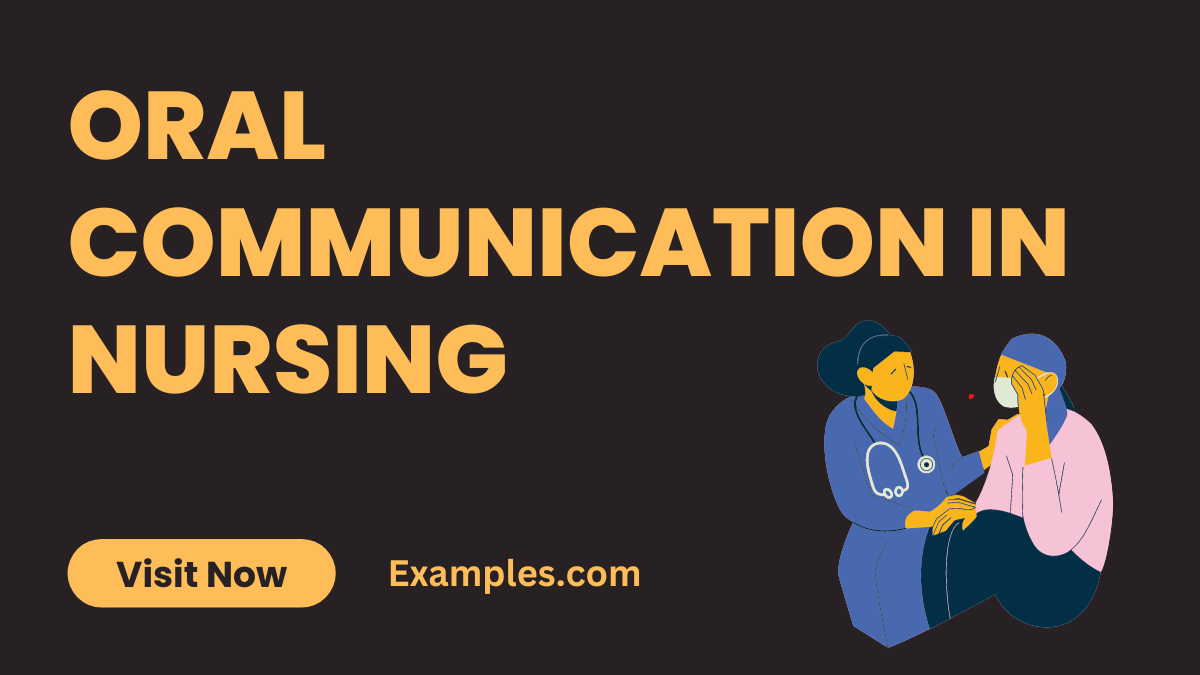29+ Oral Communication in Nursing Examples
Embark on a comprehensive journey through the realm of Oral Communication in Nursing with our complete guide, enriched with vivid Communication Examples. Explore the vital role of communication skills in healthcare, delve into effective strategies for therapeutic interactions, and witness practical applications in various nursing scenarios. Elevate your proficiency in communication, ensuring optimal patient care through this insightful guide tailored for nursing professionals. Discover the nuances of verbal and nonverbal communication that shape successful healthcare interactions.
What is Oral Communication in Nursing?

Oral communication in nursing refers to the exchange of information, thoughts, and emotions through spoken words and nonverbal cues between healthcare professionals, patients, and their families. This dynamic process is essential for delivering effective patient care, understanding needs, and fostering positive relationships. Clear communication ensures accurate transmission of medical information, enhances patient satisfaction, and contributes to overall healthcare outcomes.
What is the Best Example of Oral Communication in Nursing?

An exemplary instance of oral communication in nursing is the patient-handoff process during shift changes. This crucial exchange involves nurses effectively conveying patient information, treatment plans, and critical details to ensure continuity of care. By employing active listening, clarity in expression, and empathy, nurses can facilitate a seamless transition, promoting patient safety and well-being. This example showcases how effective oral communication is pivotal in healthcare settings for delivering quality nursing care.
30 Oral Communication in Nursing Examples

Explore a diverse array of Oral Communication in Nursing examples, each spotlighting the vital role of effective communication in healthcare settings. Our SEO-friendly insights provide a rich tapestry of scenarios, guiding healthcare professionals to enhance their communication skills for optimal patient care. From therapeutic interactions to critical care discussions, these examples offer practical guidance for navigating the complexities of oral communication in nursing.
- Bedside Reporting:
- Example: During shift changes, nurses engage in bedside reporting to update the incoming team, ensuring seamless transitions and comprehensive patient care.
- Patient Education Session:
- Example: Conducting a patient education session involves using clear language and visual aids to enhance understanding and empower patients in managing their health effectively.
- Family Consultation:
- Example: In family consultations, nurses employ empathy and compassion to address concerns, fostering collaboration in decision-making for the patient’s well-being.
- Code Blue Response:
- Example: During a Code Blue, effective communication is critical for coordinating rapid responses and ensuring a synchronized effort to save a patient’s life.
- End-of-Life Discussions:
- Example: Sensitivity and empathy are paramount in end-of-life discussions, where nurses communicate with families about palliative care options and support.
- Medication Administration:
- Example: Clearly communicating medication details, potential side effects, and instructions ensures patient safety and adherence to prescribed treatments.
- Informed Consent Process:
- Example: Nurses play a key role in the informed consent process, explaining procedures and risks to patients to facilitate informed decision-making.
- Multidisciplinary Rounds:
- Example: Effective communication in multidisciplinary rounds involves concise updates, collaboration, and coordinated planning for patient care among various healthcare professionals.
- Discharge Instructions:
- Example: Providing clear and concise discharge instructions ensures patients understand post-hospitalization care, reducing the risk of readmission.
- Pain Assessment:
- Example: Nurses employ effective communication to assess and address patients’ pain levels, tailoring interventions for optimal pain management.
- Shift Handover:
- Example: During shift handovers, nurses communicate patient status, critical information, and care plans to ensure continuity of care.
- Emergency Response Team Activation:
- Example: Activating the emergency response team requires clear and immediate communication to address critical situations effectively.
- Critical Incident Debriefing:
- Example: After a critical incident, nurses engage in debriefing sessions, fostering open communication to process emotions and learn from the experience.
- Pediatric Communication Techniques:
- Example: Using age-appropriate communication techniques is essential in pediatric care, ensuring children understand and feel comfortable expressing themselves.
- Wound Care Instructions:
- Example: Communicating wound care instructions involves clarity and detail, empowering patients to manage their healing process at home.
- Patient Advocacy:
- Example: Advocating for patients requires effective communication to convey their needs, preferences, and concerns to the healthcare team.
- Telehealth Consultations:
- Example: In telehealth consultations, nurses adapt their communication style to virtual platforms, ensuring a seamless connection with patients.
- Diagnostic Test Explanation:
- Example: Clearly explaining diagnostic tests helps patients understand the purpose, process, and potential outcomes, promoting informed decision-making.
- Crisis Intervention:
- Example: During crises, nurses employ calming communication to manage stress, reassure patients, and coordinate urgent interventions.
- Patient Feedback Sessions:
- Example: Encouraging patient feedback sessions involves creating a safe space for open communication, facilitating continuous improvement in healthcare services.
- Post-Operative Care Instructions:
- Example: Effectively communicating post-operative care instructions ensures patients follow recovery protocols, minimizing complications.
- Interpreter Utilization:
- Example: When language barriers exist, utilizing interpreters ensures accurate communication, preserving patient understanding and safety.
- Geriatric Patient Communication:
- Example: Communicating with geriatric patients requires patience, active listening, and adapting to their unique needs and communication styles.
- Psychiatric Nursing Communication:
- Example: In psychiatric nursing, therapeutic communication techniques are employed to build trust and promote mental health recovery.
- Community Health Education Programs:
- Example: Engaging in community health education programs involves effective communication to convey preventive measures, promoting community well-being.
- Rehabilitation Progress Updates:
- Example: Communicating rehabilitation progress updates involves setting realistic expectations, celebrating achievements, and addressing challenges.
- Preoperative Assessment Communication:
- Example: Clear communication during preoperative assessments ensures patients are well-informed, alleviating anxiety and promoting cooperation.
- Home Health Care Instructions:
- Example: Providing comprehensive home health care instructions involves clear communication to empower patients and their caregivers in managing health at home.
- Hospice Care Communication:
- Example: In hospice care, communication is compassionate and sensitive, addressing emotional needs and ensuring a dignified end-of-life experience.
- Continuous Professional Development Discussions:
- Example: Engaging in discussions about continuous professional development involves open communication, sharing knowledge, and fostering a culture of learning among nursing professionals.
Oral Communication in Nursing for Students Examples
Unlock the realm of oral communication in nursing tailored for students. This guide delves into scenarios where effective communication is crucial for developing essential skills. From patient interactions to professional collaborations, students will gain valuable insights into navigating the complexities of oral communication in the nursing education journey.
- Bedside Patient Interaction:
- Example: Engage in bedside communication exercises to practice empathetic patient interactions, fostering effective communication skills for future nursing practice.
- Role-Playing Scenarios:
- Example: Participate in role-playing scenarios to simulate challenging patient interactions, enhancing communication adaptability and problem-solving abilities.
- Team-Based Simulation:
- Example: Collaborate with fellow students in team-based simulations, where effective oral communication is pivotal for coordinated patient care and decision-making.
- Case Presentation Competitions:
- Example: Join case presentation competitions to sharpen communication skills, presenting complex cases clearly and concisely to a diverse audience.
- Patient Education Workshops:
- Example: Organize patient education workshops for fellow students, practicing the art of clear and engaging communication to impart medical knowledge effectively.
- Interprofessional Collaboration Exercises:
- Example: Engage in interprofessional collaboration exercises, honing oral communication skills for effective teamwork with healthcare professionals from diverse disciplines.
- Critical Incident Debriefing Simulations:
- Example: Participate in critical incident debriefing simulations to develop communication strategies for processing emotions and learning from challenging situations.
- Ethical Dilemma Discussions:
- Example: Join discussions on ethical dilemmas in healthcare, navigating oral communication to articulate perspectives, fostering ethical decision-making skills.
- Telehealth Role-Play:
- Example: Practice telehealth communication through role-play, adapting communication styles for virtual interactions and ensuring patient understanding.
- Feedback and Reflection Sessions:
- Example: Engage in feedback and reflection sessions with peers and educators, refining oral communication skills through constructive critique and self-evaluation.
Oral Communication in Nursing at Workplace Examples
Enhance workplace collaboration with these Oral Communication in Nursing examples. From effective handovers to crisis management, our SEO-friendly insights provide practical scenarios, guiding healthcare professionals to refine their communication skills for seamless and compassionate patient care.
- Interdisciplinary Team Meetings:
- Explanation: Engaging in team meetings involves effective communication to coordinate care plans and ensure holistic patient support.
- Patient Rounds:
- Conducting patient rounds requires clear communication among nurses, doctors, and other staff to discuss care plans and address patient needs.
- Conflict Resolution Discussions:
- Resolving conflicts necessitates open communication, active listening, and empathy to foster a harmonious work environment.
- Shift Handover Communication:
- Effective shift handovers involve clear communication to ensure the seamless transfer of patient information and responsibilities.
- In-Service Training Sessions:
- During in-service training, effective communication is crucial to disseminate new information, guidelines, and best practices among the nursing team.
- Telehealth Consultations with Colleagues:
- Utilizing telehealth for consultations with colleagues demands clear and concise communication to discuss cases and coordinate patient care remotely.
- Policy and Procedure Updates:
- Communicating updates in policies and procedures ensures that all team members are aligned, promoting consistent and quality care.
- Nurse-Patient Care Coordination:
- Coordinating care between nurses and patients involves effective communication to address concerns, provide information, and ensure patient comfort.
- Delegation Communication:
- Proper delegation requires clear communication about tasks, expectations, and responsibilities among team members to ensure efficient workflow.
- Informal Team Huddles:
- Informal team huddles encourage quick and effective communication, fostering camaraderie and enhancing teamwork among nursing colleagues.
Oral Communication in Nursing for Interview Examples
Prepare for nursing interviews with these Oral Communication in Nursing examples. From showcasing empathy to demonstrating professionalism, our SEO-friendly insights guide you through interview scenarios, ensuring you effectively communicate your skills and qualities.
- Demonstrating Empathy:
- In an interview, showcase empathy by expressing genuine concern for patients, emphasizing your ability to connect emotionally.
- Effective Patient Education Explanation:
- Illustrate your communication skills by explaining a complex healthcare concept to demonstrate your ability to educate and engage patients effectively.
- Handling Stressful Situations:
- When asked about handling stress, communicate your calm-under-pressure approach by citing a specific example and emphasizing your problem-solving skills.
- Conflict Resolution Scenario:
- Describe a past conflict resolution success, highlighting your communication skills in de-escalating tensions and finding collaborative solutions.
- Collaboration with Multidisciplinary Teams:
- Emphasize your ability to communicate and collaborate with diverse healthcare professionals, showcasing your effectiveness in a team-oriented environment.
- Patient Advocacy Story:
- Share a story where you advocated for a patient, highlighting your effective communication in ensuring the patient’s needs were met.
- Critical Incident Communication:
- Discuss a critical incident where effective communication played a pivotal role, showcasing your ability to handle emergencies and coordinate responses.
- Quality Improvement Communication:
- Demonstrate your commitment to quality improvement by detailing a situation where your communication contributed to enhancing patient care processes.
- Technology Adaptation:
- Highlight your adaptability by discussing a situation where you effectively communicated and embraced new technologies for improved patient care.
- Cultural Competence Showcase:
- Illustrate your cultural competence by sharing an experience where you effectively communicated with patients from diverse cultural backgrounds, ensuring inclusive and personalized care.
Why is Oral Communication so Important in Nursing?
Oral communication holds paramount significance in nursing due to its pivotal role in patient care and healthcare team collaboration. The dynamic nature of nursing requires effective verbal exchanges to convey critical information, establish rapport with patients, and ensure seamless communication among healthcare professionals. Clear and empathetic oral communication in nursing contributes to accurate diagnoses, patient satisfaction, and overall positive health outcomes. It fosters a supportive environment, essential for building trust, addressing patient concerns, and delivering patient-centered care.
- Patient Understanding: Oral communication ensures patients comprehend medical information, treatment plans, and care instructions, promoting informed decision-making and compliance.
- Team Collaboration: Effective communication is essential for coordinating care among multidisciplinary healthcare teams, fostering collaboration and optimizing patient outcomes.
- Emergency Response: Quick and precise oral communication during emergencies is critical for timely interventions, minimizing risks, and ensuring patient safety.
- Therapeutic Relationships: Building therapeutic relationships with patients hinges on effective oral communication, promoting trust, empathy, and open dialogue.
- Patient Advocacy: Advocating for patients’ needs and preferences requires clear and assertive oral communication to ensure their voices are heard and respected.
What are the Oral Communication Skills in Nursing?
Oral communication skills are a cornerstone of nursing practice, encompassing a range of abilities crucial for effective healthcare interactions. These skills go beyond mere verbal exchanges, involving active listening, empathy, and adaptability to diverse patient needs. Nursing professionals must master clear articulation, sensitivity, and the ability to convey complex medical information in a comprehensible manner. From patient assessments to interdisciplinary collaboration, honing these skills is essential for providing optimal patient care and contributing to the overall success of healthcare teams.
- Active Listening: Attentive and empathetic listening allows nurses to understand patients’ concerns, providing a foundation for personalized and effective care.
- Clarity in Expression: Articulating information clearly ensures that patients and colleagues comprehend medical details, treatment plans, and care instructions.
- Empathy and Compassion: Infusing communication with empathy and compassion enhances the patient experience, fostering trust and emotional support.
- Cultural Competence: Sensitivity to diverse cultural backgrounds enables nurses to adapt communication styles, ensuring inclusivity and understanding.
- Adaptability: Adapting communication approaches to varied patient needs and situations showcases flexibility, promoting effective healthcare interactions.
Tips for Effective Oral Communication in Nursing?
Mastering effective oral communication is paramount for nursing professionals to deliver optimal patient care and foster a collaborative healthcare environment. Explore these essential tips to enhance your communication skills, ensuring clarity, empathy, and precision in various nursing scenarios.
- Active Listening Skills: Develop active listening skills to thoroughly understand patients’ concerns, fostering trust and facilitating personalized care plans.
- Empathetic Communication: Infuse empathy into your communication to create a compassionate connection with patients, recognizing and addressing their emotional needs.
- Clarity in Patient Education: Communicate medical information clearly during patient education sessions, utilizing simple language and visual aids for enhanced understanding.
- Effective Handover Techniques: Master effective handover communication to ensure a seamless transition of patient information during shift changes, minimizing the risk of errors.
- Crisis Communication Strategies: Prepare for crises with clear and effective communication strategies, facilitating coordinated responses and maintaining patient safety.
As we conclude our exploration of oral communication in nursing, it’s essential to recognize the transformative impact of proficient communication skills in healthcare. These skills are not merely tools for conveying information; they are the cornerstone of building trust, understanding, and empathy in patient care. As nurses master the art of oral communication, they become better equipped to navigate the complexities of patient interactions, from delivering difficult news to celebrating health milestones. This journey of communication excellence is a continuous process, fostering a culture of compassionate care and mutual respect within the healthcare environment.
In this vein, the American Nurses Association (ANA) offers a wealth of resources and guidelines for nurses seeking to enhance their communication skills. Their insights on patient-centered communication and interprofessional collaboration are invaluable for healthcare professionals (ANA Nursing World). Furthermore, the Centers for Disease Control and Prevention (CDC) provide guidelines on health communication, which are critical for nurses in delivering effective and empathetic care (CDC Health Communication). By leveraging these resources, nurses can continue to refine their oral communication skills, ensuring they remain at the forefront of patient care excellence.



